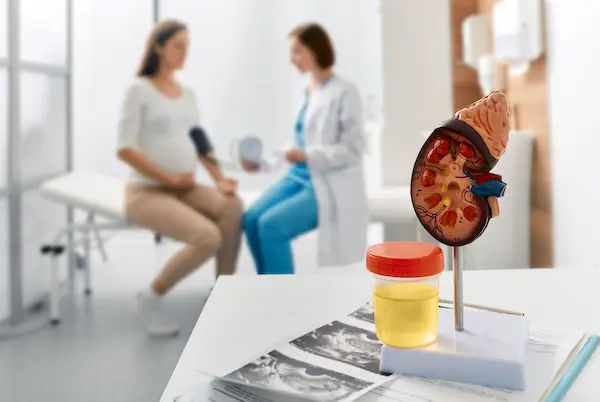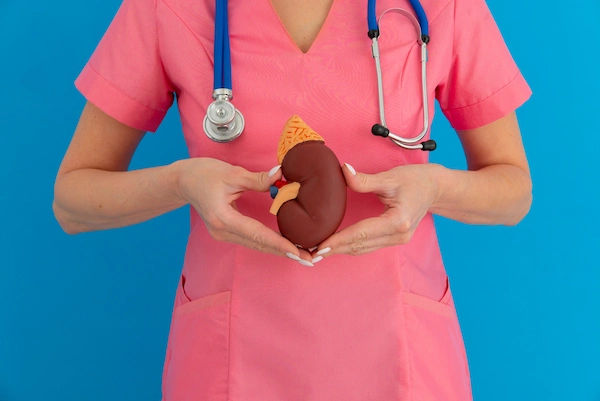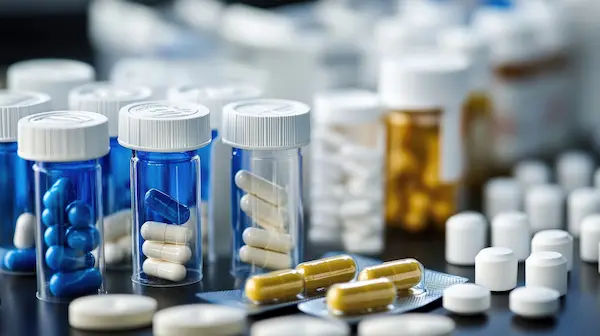Guide to Kidney Function Test
Your guide to Kidney Function Tests (KFTs). Understand what these blood and urine tests measure, why they are important for detecting kidney disease, and what to expect during testing.

Written by Dr. Dhankecha Mayank Dineshbhai
Reviewed by Dr. Siri Nallapu MBBS
Last updated on 13th Jan, 2026

Introduction
Your kidneys are your body's unsung heroes, working tirelessly around the clock to filter waste, balance fluids, and regulate blood pressure. But how do you know if these vital organs are functioning optimally? This is where kidney function tests come in. Often appearing as part of a routine blood panel, these tests provide a crucial window into your renal health. This comprehensive guide will demystify these tests, explaining what they measure, why they matter, and how to understand your results. Whether you're managing a chronic condition like diabetes or simply being proactive about your health, understanding kidney function is a key step in taking control of your well-being. We'll break down the science into simple terms, empowering you to have informed conversations with your healthcare provider.
Why Are Kidney Function Tests So Important?
Kidney function tests are critical because they act as an early warning system. They can detect issues long before physical symptoms arise, allowing for early intervention that can slow or even prevent the progression of kidney disease.
The Silent Nature of Kidney Disease
Kidney disease is often called a "silent" illness because it can progress to a very advanced stage without causing any noticeable symptoms. You might feel perfectly fine even if your kidney function is significantly reduced. By the time symptoms like fatigue, swelling, or changes in urination become apparent, a substantial amount of damage may have already occurred. Regular testing is the only reliable way to catch problems early.
Who Should Get a Kidney Function Test?
While everyone can benefit from occasional monitoring, certain groups are at higher risk and should be tested more regularly. This includes individuals with:
Diabetes: High blood sugar can damage the kidneys' filtering units over time.
High blood pressure (Hypertension): This can strain the blood vessels in the kidneys.
Heart disease: There is a strong link between cardiovascular and kidney health.
A family history of kidney failure.
Those who are overweight or obese.
People over the age of 60.
If you fall into any of these categories, discussing a kidney health screening with your doctor is a prudent step.
Decoding the Key Kidney Function Blood Tests
A typical renal function panel consists of several measurements. Let's explore the most important ones.
Serum Creatinine: A Waste Product Metric
Creatinine is a waste product generated by the normal wear and tear of your muscles. Healthy kidneys filter it from your blood into your urine. The serum creatinine test measures the level of creatinine left in your blood.
What it means: A high level indicates that your kidneys aren't clearing waste effectively. However, levels can vary based on age, body size, and muscle mass (muscular individuals may naturally have higher levels).
Normal range: Approximately 0.7 to 1.3 mg/dL for men and 0.6 to 1.1 mg/dL for women.
Glomerular Filtration Rate (eGFR): The Gold Standard
The estimated Glomerular Filtration Rate (eGFR) is considered the best overall measure of kidney function. It's not a direct test but is calculated using your serum creatinine level, along with your age, sex, and body size.
What it means: eGFR estimates how many milliliters of blood your kidneys filter each minute. A higher number indicates better function.
Normal range: An eGFR above 90 mL/min/1.73m² is generally considered normal. Values between 60 and 89 may require monitoring, especially if there's other evidence of kidney disease (like protein in urine). An eGFR below 60 for three months or more is a sign of chronic kidney disease.
Blood Urea Nitrogen (BUN): Tracking Protein Waste
Urea nitrogen is another waste product, formed when your body breaks down protein from food. The BUN test measures the amount of this waste in your blood.
What it means: Like creatinine, high BUN levels can suggest impaired kidney function. However, BUN is influenced by other factors, such as a high-protein diet, dehydration, or internal bleeding, so it's always interpreted alongside creatinine.
Normal range: Typically between 7 and 20 mg/dL.
Consult Top Specialists for Personalised Tips
The Role of Urine Tests in Kidney Health
Blood tests tell one part of the story; urine tests complete the picture by showing what your kidneys are excreting—or failing to excrete.
Urinalysis: Checking for Protein and Blood
A urinalysis is a simple test that examines a sample of your urine. For kidney health, the most important things it checks for are:
Protein (Proteinuria): Healthy kidneys keep large protein molecules in the blood. If filters are damaged, protein can leak into the urine, an early sign of kidney damage.
Blood (Hematuria): Blood in the urine can signal various conditions, including kidney disease, infections, or stones.
Albumin-to-Creatinine Ratio (UACR): A Sensitive Early Marker
This is a more precise urine test that measures the amount of a specific protein (albumin) compared to creatinine. It's more sensitive than a standard dipstick test for protein and is a key marker for detecting early kidney damage, particularly in people with diabetes.
What it means: A high UACR (30 mg/g or higher) is a clear sign of kidney damage and a risk factor for cardiovascular disease.
How to Interpret Your Kidney Test Results?
Understanding your numbers is empowering, but it's crucial to remember that a doctor must interpret them in the context of your overall health.
What Do "Normal" Ranges Really Mean?
"Normal" ranges can vary slightly between labs. Your doctor will look at trends over time. A result that is at the high end of normal but has been steadily creeping up might be more concerning than a stable result that is just outside the normal range due to other factors.
Understanding Stages of Kidney Disease (Based on eGFR)
Chronic Kidney Disease (CKD) is classified into five stages based primarily on eGFR:
Stage 1: Kidney damage with normal eGFR (90 or above).
Stage 2: Kidney damage with mild reduction in eGFR (60-89).
Stage 3: Moderate reduction in eGFR (30-59). Symptoms may begin.
Stage 4: Severe reduction in eGFR (15-29). Preparation for end-stage treatment begins.
Stage 5: Kidney failure (eGFR less than 15). Dialysis or transplant is needed.
What Causes Abnormal Kidney Function Test Results?
Abnormal results can point to two main types of problems: acute or chronic.
Acute vs. Chronic Kidney Injury
Acute Kidney Injury (AKI): A sudden drop in kidney function, often caused by severe dehydration, a dangerous infection, or a medication side effect. It can often be reversed with prompt treatment.
Chronic Kidney Disease (CKD): A long-term, progressive loss of function. The most common causes of high creatinine levels chronically are diabetes and high blood pressure.
Preparing for a Kidney Function Test
Preparation is usually simple. Your doctor may advise you to fast for kidney function test accuracy, typically for 8-12 hours beforehand, especially if other tests like blood glucose are being done. Always inform your doctor about any medications or supplements you're taking, as some can affect results. Staying well-hydrated is important, but avoid excessive water intake right before the test.
Next Steps After an Abnormal Test
An abnormal result is not a diagnosis; it's a starting point for investigation. If your kidney test results are consistently outside the normal range, consult a doctor online with Apollo24|7 for further evaluation. They may:
1. Repeat the tests to confirm the results.
2. Order more detailed tests, like a renal ultrasound or more specific blood panels.
3. Investigate the underlying cause (e.g., improving blood sugar or blood pressure control).
4. Refer you to a kidney specialist (nephrologist).
Conclusion
Understanding your kidney function tests is a powerful tool in managing your long-term health. These tests provide vital, often early, insights into how well your body's filtration system is working. By knowing what serum creatinine, eGFR, BUN, and UACR mean, you can move from a place of uncertainty to one of empowerment. Remember, proactive monitoring is especially important if you have risk factors like diabetes or hypertension. If your tests reveal an issue, view it as an opportunity to take action—through lifestyle changes, medication, and ongoing care—to protect your kidney health for years to come. Don't wait for symptoms to appear; take charge of your health today.
Consult Top Specialists
Consult Top Specialists for Personalised Tips

Dr. Rajib Ghose
General Physician/ Internal Medicine Specialist
25 Years • MBBS
East Midnapore
VIVEKANANDA SEBA SADAN, East Midnapore

Dr. Swagato Podder
General Practitioner
5 Years • MBBS
Kolkata
GRD POLYCLINIC, Kolkata

Dr. Moumita Roy
General Physician/ Internal Medicine Specialist
8 Years • MBBS , MD (Anesthesiology)
Kolkata
VDC Clinic, Kolkata

Dr. Dayanashre N
General Physician
3 Years • MBBS
Bengaluru
PRESTIGE SHANTHINIKETAN - SOCIETY CLINIC, Bengaluru

Dr. Arif Ahmed
General Physician/ Internal Medicine Specialist
9 Years • MBBS, MD (Genl. Med.)
Kolkata
MCR SUPER SPECIALITY POLY CLINIC & PATHOLOGY, Kolkata
Consult Top Specialists

Dr. Rajib Ghose
General Physician/ Internal Medicine Specialist
25 Years • MBBS
East Midnapore
VIVEKANANDA SEBA SADAN, East Midnapore

Dr. Swagato Podder
General Practitioner
5 Years • MBBS
Kolkata
GRD POLYCLINIC, Kolkata

Dr. Moumita Roy
General Physician/ Internal Medicine Specialist
8 Years • MBBS , MD (Anesthesiology)
Kolkata
VDC Clinic, Kolkata

Dr. Dayanashre N
General Physician
3 Years • MBBS
Bengaluru
PRESTIGE SHANTHINIKETAN - SOCIETY CLINIC, Bengaluru

Dr. Arif Ahmed
General Physician/ Internal Medicine Specialist
9 Years • MBBS, MD (Genl. Med.)
Kolkata
MCR SUPER SPECIALITY POLY CLINIC & PATHOLOGY, Kolkata
More articles from Kidney Disease
Frequently Asked Questions
Can dehydration affect a kidney function test?
Yes, significant dehydration can cause a temporary rise in both BUN and serum creatinine levels, making your kidney function appear worse than it is. This is why it's important to be normally hydrated before a test, unless instructed to fast.
What is a dangerously high creatinine level?
There's no single 'dangerous' number, as it depends on the individual. However, a level above 1.3 for women or 1.4 for men is often considered elevated. Levels that climb above 2.0, especially if confirmed over time, typically indicate significant kidney impairment and require immediate medical attention.
How can I improve my eGFR and lower creatinine naturally?
While you cannot reverse significant damage, you can support kidney health by: managing blood pressure and diabetes, reducing sodium intake, eating a balanced diet lower in protein, staying hydrated, avoiding NSAID painkillers (like ibuprofen), and not smoking. Always discuss dietary changes with your doctor.
Are at-home kidney test kits accurate?
At-home test strips that check urine for protein and blood can be a useful screening tool but are not as accurate as lab tests. They can produce false positives or negatives. A lab-performed blood and urine test ordered by a doctor is the gold standard for diagnosis.
How often should I get my kidney function checked?
If you have no risk factors, a check-up during your annual physical may be sufficient. If you have diabetes, hypertension, or a family history, your doctor may recommend testing every 6 to 12 months, or even more frequently if your condition is not well-controlled.



.webp)
